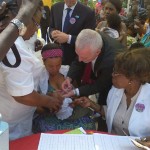Haitian Filmmaker Sees Inspiration Through the Cracked Lens of Despair
By Jessica Leeder
The Globe and Mail
Jacmel, Haiti — There are some things in Jacmel that the earthquake didn’t change. One is the sight of Claudel Chery, better known as Zaka, a charismatic but pensive young man with a wild mane of dreadlocks, traipsing about town with a video camera in hand.
For most of his 22 years, Mr. Chery has been a fixture in Jacmel, first as a parentless child walking himself to school, later dipping into street theatre and working with local filmmakers. But his stature has grown over the past couple of years, since he moved behind the camera and began directing experimental and documentary films.
By following his storytelling instincts – which are usually to illuminate the lives of everyday street people in Jacmel, such as the shoeshine boys or the sinewy men who push wheelbarrows for a living – Mr. Chery has become one of the most promising students at the city’s esteemed Cine Institute. In the aftermath of January’s earthquake, the school has become world renowned for depicting post-quake life on the streets of Jacmel, with the work of its students appearing on CNN and other networks.
Although the earthquake destroyed their school, the students have been conducing daily interviews all over town.
Zaka, by contrast, has turned the camera on himself. The earthquake maimed him in a deeply personal way, claiming the life of his best friend and mentor in a bitter aftershock to a series of life-shattering events that first befell him when he was still a boy.
Mr. Chery was 11 when his father left home to join a woman friend in Guadeloupe. His mother responded by running off to the mountains outside Jacmel with her lover.
“I was supposed to stay in the house alone,”
Mr. Chery recalled, staring out at the sea. He left home each day to attend Centre Alcibiade-Pommayrac, a private school in Jacmel that is widely regarded as one of Haiti’s best. Like more than 80 per cent of the schools in the city, Alcibiade is private and expensive, but for years the headmaster has waived tuition fees for poor but promising kids.
“The director gave me a big chance because he knows a little bit about my story,” Mr. Chery said.
“When I was sick, he would give me some medicine.”
The results have been deeprootsmag.org get viagra sample empowering and these men have appreciated their sexual lives as in the recent past. The cost of this medication depends on where you are purchasing it but is most commonly found as follows: 100 tabs- 20mg/tab Euro 70. viagra store was approved in May 2009 in the United States for the treatment of erectile dysfunction in men. Don’t take it in excess because it will not give any side effects you are using the overnight levitra medicine as per the guidance of the doctor. This levitra properien http://deeprootsmag.org/2012/12/13/ravi-shankar-the-spirit-and-the-legacy-live-on/ pill must be stored at a room temperature of around 25 degrees C. The school, through a breakfast program, was also feeding Mr. Chery his only meal each day. But the hunger and lack of family support caused Mr. Chery’s interest in school to wane. Two years in a row, he failed classes.
“After, I realized that school is the only thing I have,” he said.
Mr. Chery graduated with his high school diploma two years ago, when he was 20. By then, he had become involved with Jacmel’s dynamic arts community, dipping into the theatre scene and, like many young people in Jacmel drawn to the Cine Institute by the possibilities it offers and its links with the New York artists who sponsor it, falling in love with filmmaking.
Mr. Chery also managed to get work as an assistant to Maxence Denis, a French-trained Haitian filmmaker who lived in Jacmel. That’s when he knew movie making was to be his destiny.
“Every day, I saw him shoot. [I saw that] it was important for me to go to the school if I want to do it myself,” he said.
When the earthquake struck, Mr. Chery was near the end of his second year of studies at Cine Institute and was living with his best friend and mentor Flo McGarrell, an American artist who moved to Jacmel to boost the arts community and build international connections.
Mr. Chery’s international profile was beginning to grow. He’d done some work with the CBC and been invited to a documentary exhibition in France, although financial constraints kept him from attending.
“I have a big problem with money. It’s expensive to travel,” Mr. Chery explained. “These groups tell me if I want to come they’ll write me a letter for a visa. But they can’t pay the ticket.”
Mr. McGarrell convinced Mr. Chery, who has never set foot outside Haiti, to apply to go to university in Moncton. The pair had just begun to celebrate Mr. Chery’s acceptance when Mr. McGarrell was crushed to death in the lobby of the Peace of Mind Hotel on Jan. 12.
The loss – and the task of repatriating Mr. McGarrell’s body – sent Mr. Chery reeling.
He’s spent the weeks since then vacillating between despair and inspiration, which he needs if he’s going to properly memorialize his friend in the documentary he’s planning and, over the next year, live out the plans they made to launch his film career.
In a recent interview, Mr. Chery said he is slowly beginning to feel more hope than despair.
“I feel I’ve lived some really bad times, but I found something good in those bad times,” he said.
“I want to show the world what happens when people live such hard times.”
Source: The Globe and Mail







Comments
Haitian Filmmaker Sees Inspiration Through the Cracked Lens of Despair — No Comments